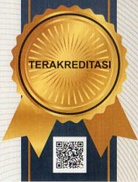The Students’ Ability in Reading Comprehension of TOEFL Test For The EFL Learners
Abstract
The objectives of the research are to know the students’ ability in reading comprehension of TOEFL test for the EFL Learners. This study was categorized as a descriptive quantitative research. This study was conducted at the eighth semester students of Hamzanwadi University. The population of this study was 144 students from 3 classes and the sampling method was purposive sampling. The sample of this study was 30 students. The research instrument used to collect data was reading comprehension of TOEFL test. The collected data were submitted to descriptive statistic by using SPSS 22 for windows. The mean score of the test was 4.17, it categorized into low. Based on that result, the EFL Learners did not have good ability in finding main ideas, references, and meaning of words on reading of TOEFL test. Meanwhile, the mean score in finding information was 7.2 and inference was 6.4. So, the EFL Learners did not have good ability in finding information and inference.
Abstrak
Tujuan dari penelitian ini adalah untuk mengetahui kemampuan mahasiswa dalam membaca pemahaman tes TOEFL untuk Peserta Didik EFL. Penelitian ini dikategorikan sebagai penelitian kuantitatif deskriptif. Penelitian ini dilakukan pada mahasiswa semester delapan Universitas Hamzanwadi. Populasi penelitian ini adalah 144 mahasiswa dari 3 kelas dan metode sampling menggunakan purposive sampling. Sampel penelitian ini adalah 30 mahasiswa. Instrumen penelitian yang digunakan untuk mengumpulkan data adalah pemahaman membaca TOEFL. Data yang dikumpulkan diserahkan ke statistik deskriptif dengan menggunakan SPSS 22 untuk windows. Skor rata-rata tes adalah 4,17, dimana dikategorikan ke rendah. Berdasarkan hasil tersebut, Peserta Didik EFL tidak memiliki kemampuan yang baik dalam menemukan ide utama, referensi, dan makna kata pada tes pemahaman membaca TOEFL. Sementara itu, skor rata-rata dalam menemukan informasi adalah 7,2 dan kesimpulan adalah 6,4. Jadi, Peserta Didik EFL tidak memiliki kemampuan yang baik dalam menemukan informasi dan kesimpulan.
Keywords
Full Text:
PDFReferences
Allahyari, M., Pouriyeh, S., Assefi, M., Safaei, S., Trippe, E. D., Gutierrez, J. B., & Kochut, K. (2017). Text summarization techniques: a brief survey. ArXiv Preprint ArXiv:1707.02268.
Arshad, A., Shakir, A., & Ahmad, M. (2020). A Review on the Principles of a Reading Comprehension Test Construction to assess the Test Takers at different levels. Hamdard Islamicus, 43(1&2), 123–138.
Brante, E. W., & Strømsø, H. I. (2018). Sourcing in text comprehension: A review of interventions targeting sourcing skills. Educational Psychology Review, 30(3), 773–799.
Bråten, I., & Braasch, J. L. G. (2017). Key issues in research on students’ critical reading and learning in the 21st century information society. In Improving reading and reading engagement in the 21st century (pp. 77–98). Springer.
Cho, Y., Ginsburgh, M., Morgan, R., Moulder, B., Xi, X., & Hauck, M. C. (2017). Designing TOEFL® PrimaryTM tests. English Language Proficiency Assessments for Young Learners, 41–58.
Darr, J. A. (2020). On character building: The reader and the rhetoric of characterization in Luke-Acts. Wipf and Stock Publishers.
Dempsey, L. (2018). Understanding story read-alouds: the influence of story goal structure and event knowledge on pre-readers’ inferencing abilities. Early Child Development and Care.
Elleman, A. M. (2017). Examining the impact of inference instruction on the literal and inferential comprehension of skilled and less skilled readers: A meta-analytic review. Journal of Educational Psychology, 109(6), 761.
Hedgcock, J. S., & Ferris, D. R. (2018). Teaching readers of English: Students, texts, and contexts. Routledge.
Isbell, D. R., & Kremmel, B. (2020). Test review: Current options in at-home language proficiency tests for making high-stakes decisions. Language Testing, 37(4), 600–619.
Juliana, J. (2018). The Comparative Impacts of Using Lexical Glossing and Inferencing Strategies on Students’ Reading Comprehension.
Kamal, M. (2018). Issues Faced by Students in Comprehending TOEFL Reading Text. UIN Ar-Raniry Banda Aceh.
Lambe, L. (2018). Teaching reading comprehension in EFL classroom: A glance at some approaches and activities. Journal of English Language and Literature Teaching, 2(02).
Lamon, S. J. (2020). Teaching fractions and ratios for understanding: Essential content knowledge and instructional strategies for teachers. Routledge.
Landi, N., & Ryherd, K. (2017). Understanding specific reading comprehension deficit: A review. Language and Linguistics Compass, 11(2), e12234.
Nordin, R., & Eng, L. S. (2017). Text-Selection for Teaching Reading to ESL Tertiary Students: A Study on Genre and Content Preferences. International Journal of Instruction, 10(1), 71–84.
OBE, S. W. (2018). The meaning of everything: The story of the Oxford English Dictionary. Oxford University Press.
Papageorgiou, S., Wu, S., Hsieh, C., Tannenbaum, R. J., & Cheng, M. (2019). Mapping the TOEFL iBT® Test Scores to China’s Standards of English Language Ability: Implications for Score Interpretation and Use. ETS Research Report Series, 2019(1), 1–49.
Rastegar, M., Kermani, E. M., & Khabir, M. (2017). The relationship between metacognitive reading strategies use and reading comprehension achievement of EFL learners. Open Journal of Modern Linguistics, 7(2), 65–74.
Ribeiro, I., Cadime, I., Freitas, T., & Viana, F. L. (2016). Beyond word recognition, fluency, and vocabulary: The influence of reasoning on reading comprehension. Australian Journal of Psychology, 68(2), 107–115.
Rivers, W. M. (2018). Teaching Foreign Language Skills Rev Ed. University of Chicago Press.
Rouet, J.-F., Britt, M. A., & Durik, A. M. (2017). RESOLV: Readers’ representation of reading contexts and tasks. Educational Psychologist, 52(3), 200–215.
Samad, I. A., Jannah, M., & Fitriani, S. S. (2017). EFL STUDENTS’STRATEGIES DEALING WITH COMMON DIFFICULTIES IN TOEFL READING COMPREHENSION SECTION. International Journal of Language Education, 1(1).
Santoso, S. P. (2018). The implementation of race to the board game to improve students’ ability in memorizing countable noun vocabulary at eight grade of mts al-washliyah tembung. Fakultas Ilmu Tarbiyah Dan Keguruan Universitas Islam Negeri Sumatera Utara.
Spiro, R. J. (2017). Remembering information from text: The “state of schema” approach. In Schooling and the acquisition of knowledge (pp. 137–165). Routledge.
van den Broek, P., & Helder, A. (2017). Cognitive processes in discourse comprehension: Passive processes, reader-initiated processes, and evolving mental representations. Discourse Processes, 54(5–6), 360–372.
Villarroel, V., Bloxham, S., Bruna, D., Bruna, C., & Herrera-Seda, C. (2018). Authentic assessment: Creating a blueprint for course design. Assessment & Evaluation in Higher Education, 43(5), 840–854.
Wang, E., Matsumura, L. C., & Correnti, R. (2017). Written feedback to support students’ higher level thinking about texts in writing. The Reading Teacher, 71(1), 101–107.
Wang, Z., Sabatini, J., O’Reilly, T., & Feng, G. (2017). How individual differences interact with task demands in text processing. Scientific Studies of Reading, 21(2), 165–178.
DOI: https://doi.org/10.32487/jshp.v6i1.1296
Refbacks
- There are currently no refbacks.
JSHP: Jurnal Sosial Humaniora dan Pendidikan
is licensed under a Creative Commons Attribution-ShareAlike 4.0 International License (CC BY-SA 4.0)




